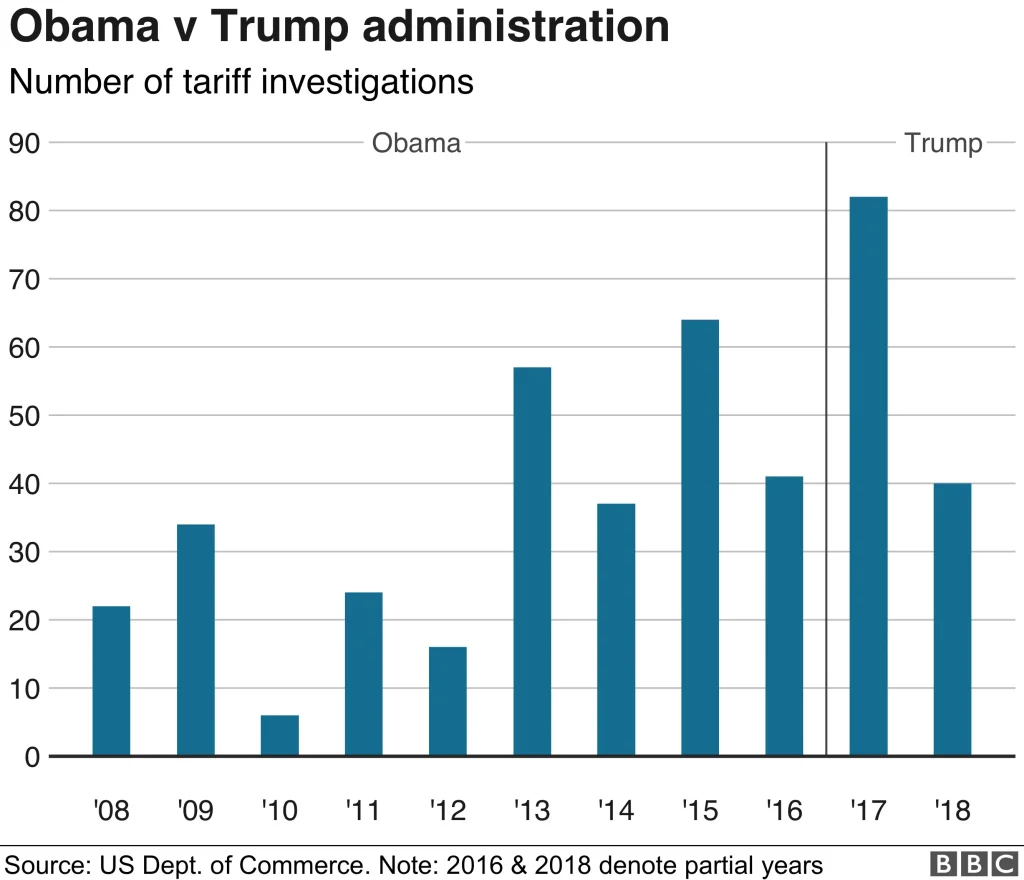The Trump administration tariffs have been a pivotal topic in U.S. trade policy, especially with the recent developments surrounding a federal appeals court ruling. Aiming to reshape international trade dynamics, President Donald Trump’s tariffs faced legal challenges that threatened their enforcement. Critics of the administration, including business plaintiff lawyers, have argued that these tariffs inflict irreparable harm on the economy. In response, the Trump administration has sought “emergency relief” through the Supreme Court, illustrating the contentious nature of tariff enforcement in the current political landscape. As tensions rise, the discussions around the International Emergency Economic Powers Act and its implications for future tariff implementations remain crucial.
The ongoing situation surrounding the trade duties imposed by the former administration highlights a significant chapter in global economic policy. With recent judicial scrutiny, the legality of these imposed levies has come under fire, raising questions about presidential authority in economic matters. The ruling from the trade court has provoked a swift reaction, as policymakers and trade advisors navigate the complex realm of tariff legislation and judicial review. Various stakeholders, including states’ attorneys general and business interests, have mobilized against what they view as excess government power. As the appeals process unfolds in the higher courts, the outcome could set profound precedents for future economic strategies and international relations.
Overview of Trump Administration Tariffs
The Trump administration implemented a series of tariffs during his presidency, intending to protect American industries from foreign competition and to promote the concept of ‘America First’ in trade policy. These tariffs have been a subject of heated debates and legal scrutiny, particularly concerning their legality and the authority under which they were imposed. Using the International Emergency Economic Powers Act, which allows for imposing tariffs in response to emergencies, the administration faced challenges in justifying the expansive scope of these duties.
Recently, a federal appeals court granted the Trump administration a temporary stay on a ruling that invalidated many of these tariffs. The administration argued that the lower court’s decision threatened the economic stability of various sectors and undermined trade negotiations with other countries. This ongoing legal battle highlights the contentious nature of trade policy in the U.S. and raises questions about the balance of power between the executive branch and the judiciary in tariff enforcement.
The Legal Battle Over Tariff Enforcement
The recent ruling by the U.S. Court of International Trade has sparked a significant legal battle over the enforcement of tariffs established during the Trump administration. With the court’s decision to invalidate the tariffs based on the claim that the International Emergency Economic Powers Act does not grant broad presidential powers, the administration seeks to counter these assertions. Experts anticipate that the appeals court will play a critical role in determining the legality of these tariffs and the extent of the executive authority in initiating such trade measures.
As the appeals process unfolds, both the Trump administration and the plaintiffs — composed of state attorneys general and domestic businesses — prepare their arguments. The implications of this case stretch far beyond the parties involved, potentially setting a precedent for how tariffs can be imposed in the future without overstepping legal boundaries. Observers note that this litigation reflects the tension between upholding the rule of law and the pressures of international trade.
Impacts on Domestic Businesses and Consumers
The tariffs instituted by the Trump administration have significantly impacted domestic businesses, with many companies expressing concerns over increased costs of imported goods. As the legal proceedings continue, businesses are left in limbo regarding pricing strategies and product availability. If the appeals court affirms the lower court’s ruling, many industries might experience relief; however, that relief could be temporary as the administration has indicated it may find alternate methods to enact similar tariffs.
Additionally, consumers have felt the effects of these tariffs, often resulting in higher prices for everyday goods. Increased tariffs on products such as electronics, furniture, and agricultural products have redirected cost burdens onto consumers. The ongoing legal battles can influence market stability and consumer confidence, making it vital for businesses to navigate these changes effectively as they prepare for potential outcomes in the appeals process.
Reactions from Trump Officials
In response to the court’s ruling, officials in the Trump administration have vehemently criticized the trade court judges for what they perceive as judicial overreach. Key figures such as Peter Navarro and Stephen Miller have articulated a stance that portrays these legal challenges as an attack on the administration’s economic policies. By characterizing the issue as a matter of national interest and economic security, they are rallying support from those who believe tariffs are essential for protecting American jobs.
Moreover, the assertion that the administration will continue to seek new avenues for imposing tariffs has been a significant talking point in the media. The rhetoric from the administration highlights a determination to pursue its trade agenda despite judicial setbacks, creating an atmosphere of uncertainty in the markets. This combative stance underscores the polarized nature of trade policy discussions in the U.S., particularly in the context of ongoing legal disputes.
Emergency Relief and the Supreme Court
As the Trump administration navigates this complex legal landscape, the prospect of seeking emergency relief from the Supreme Court looms large. The administration notified the U.S. Court of Appeals for the Federal Circuit of its intention to pursue such relief if needed to maintain the status quo concerning tariff enforcement. Legal experts indicate that the Supreme Court’s involvement could provide the ultimate clarification of the powers associated with implementing tariffs and their alignment with existing statutes.
Should the Supreme Court take up the case, the ruling could have far-reaching implications on how tariffs are handled in the future and the broader question of executive power. Critics argue that the judiciary must ensure that no single branch of government exceeds its bounds, while supporters of the tariffs maintain that decisive action is necessary to safeguard American interests. Regardless of the outcome, this situation underscores the critical intersection between law, trade, and economics.
Criticisms of the Judicial Ruling
The judicial ruling that invalidated many of the Trump administration’s tariffs has been met with a chorus of criticism from administration officials. They argue that the judges overstepped their authority by encroaching on executive powers designated for tariff enforcement. This backlash indicates a growing tension between the judicial system and government policies, particularly in areas related to international trade and economic strategy.
The administration’s narrative framing the ruling as a threat to national stability reinforces its call to action for supportive constituents. Notably, White House press secretary Karoline Leavitt stated that the judges’ decisions could jeopardize the United States’ reputation on the global stage. Such a perspective illustrates the broader implications of judicial decisions on international relations and economic diplomacy.
Future of Tariffs and the Appeals Process
As the appeals process unfolds, the future of tariffs imposed during the Trump administration hangs in the balance. Depending on the appeals court’s decisions, there could be significant shifts in trade policy and the way tariffs are enforced in the United States. The administration’s assertion that it might pursue alternative methods for imposing tariffs indicates an intention to maintain its trade strategy, regardless of the court’s rulings.
The outcome of this legal battle will not only affect the Trump administration but also set a precedent for future administrations regarding tariff implementation and regulatory compliance. Stakeholders across the economic spectrum are closely monitoring the situation, aware that the appeal’s resolution could reshape the trade landscape and redefine how tariffs are perceived within the legal framework of U.S. governance.
Implications for International Trade Relations
The legal challenges surrounding the Trump administration’s tariffs have significant implications for international trade relations. A ruling that affirms the tariffs’ validity could embolden future administrations to impose similar measures without fear of legal reprisal, while a ruling striking down the tariffs may restore some predictability to international trade agreements. The outcome will also affect how countries negotiate and respond to U.S. trade policies moving forward.
Moreover, international stakeholders are watching the U.S. legal system’s handling of tariffs closely. The judicial interpretations of the powers afforded to the president under the International Emergency Economic Powers Act will likely influence how other nations perceive the U.S.’s commitment to fair trade practices. In this global economy, the ramifications extend beyond U.S. shores, as trade partners reconsider their strategies in light of potential shifts in American trade policy.
Economic Predictions in Light of Tariff Developments
In light of the ongoing legal challenges surrounding the Trump administration’s tariffs, economic predictions are heavily influenced by the outcomes of the appeals process. Economic analysts have speculated that prolonged uncertainty will likely lead to a cautious approach among businesses and consumers, impacting spending trends and investment. Should the appeals court uphold the tariffs, analysts predict a potential slowdown in certain sectors due to higher costs and diminished consumer confidence.
Conversely, if the court rules against the tariffs, there may be an immediate economic upsurge, as businesses would react positively to reduced import costs and enhanced competitiveness in the market. Regardless of the final judgment, it is clear that the ramifications of these legal battles will have a lasting impact on the economic landscape, guiding future trade policies and practices.
Frequently Asked Questions
What are the implications of the Trump administration tariffs being paused by the federal appeals court?
The federal appeals court paused the Trump administration tariffs temporarily, allowing the government to prepare its case against a lower court ruling that invalidated most tariffs. This pause helps maintain the status quo of trade policies while the appeals process unfolds, preventing immediate harm to industries reliant on these tariffs.
How does the International Emergency Economic Powers Act relate to the Trump administration tariffs?
The Trump administration tariffs were enacted under the authority of the International Emergency Economic Powers Act. However, a trade court ruling indicated that this law does not grant unlimited power to presidents, potentially impacting future tariffs imposed under this act.
What does ’emergency relief’ from the Supreme Court mean for Trump tariffs?
The Trump administration seeks ’emergency relief’ from the Supreme Court to maintain its tariffs during the appeal process. If granted, this relief would allow the government to continue enforcing the tariffs while legal challenges are ongoing.
Why did Trump administration officials criticize trade court judges following the tariff ruling?
Trump administration officials, including Peter Navarro and Stephen Miller, criticized trade court judges for overstepping their authority in invalidating the tariffs. They argued that such rulings threaten U.S. credibility in international trade and represent judicial overreach.
What sorts of alternatives does the Trump administration have for tariff enforcement?
If the Trump administration’s current tariff enforcement strategy fails, officials claim they have alternative methods to impose tariffs. Trump trade advisor Peter Navarro asserted that the administration would find other ways to institute trade policies, ensuring continued protectionism despite court challenges.
What is the next step for the Trump administration regarding the federal appeals court ruling on tariffs?
The Trump administration must wait for a response from the plaintiffs, consisting of state attorneys general and businesses, to their request for a stay pending appeal. This response will be followed by a government reply, as the courts deliberate on whether to uphold or invalidate the temporary pause on the tariffs.
How might the Supreme Court intervene in the Trump administration tariffs issue?
The Supreme Court may intervene by reviewing the arguments and granting ’emergency relief’ to the Trump administration. Such action could restore the enforceability of the tariffs while the appellate process continues, impacting international trade and economic relations.
What has been the primary argument against the authority of Trump tariffs based on the court ruling?
The primary argument against the Trump tariffs is that the International Emergency Economic Powers Act does not provide the president with unlimited authority to impose tariffs. The court’s ruling emphasized the need for clear legal boundaries on presidential powers in trade enforcement.
| Key Points |
|---|
| The Trump administration has temporarily halted a lower court ruling that invalidated most of its tariffs. |
| The U.S. Court of Appeals for the Federal Circuit is considering the administration’s emergency relief request from the Supreme Court. |
| Trump advisors assert they will find alternative ways to impose tariffs, regardless of the court’s decision. |
| The trade court invalidated Trump’s tariffs, stating he lacked the authority under the International Emergency Economic Powers Act. |
| Plaintiffs, including state attorneys general and businesses, are poised to respond to the administration’s appeal within a week. |
| White House officials criticized the trade judges, claiming their actions threaten U.S. credibility internationally. |
Summary
Trump administration tariffs have been a contentious issue as a federal appeals court has granted the administration a temporary reprieve from a ruling that invalidated most of these tariffs. This scenario highlights the ongoing legal battles and political discourse surrounding trade policies instituted by Donald Trump, revealing differing perspectives on the extent of presidential authority in trade matters. As the administration prepares to argue its case in the higher courts, it remains determined to maintain its tariff strategies despite judicial setbacks.



